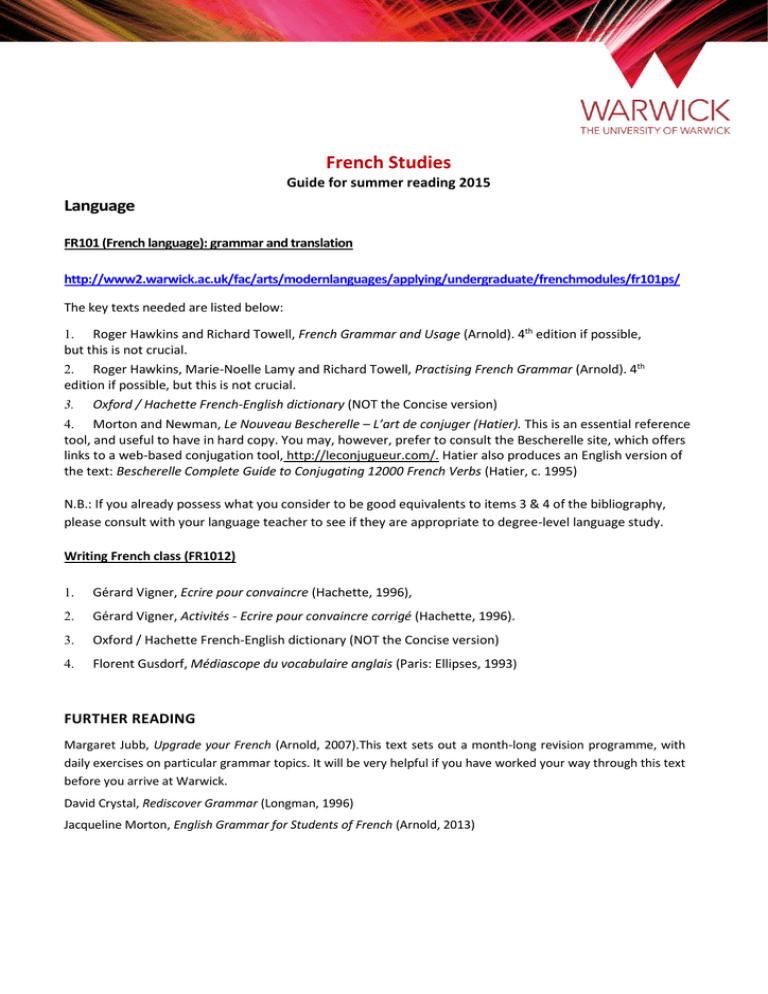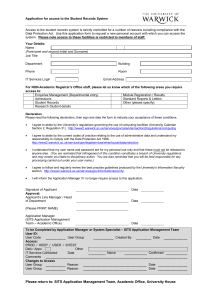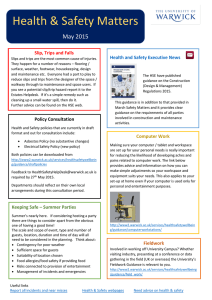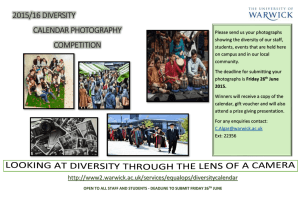French Studies Language Guide for summer reading 2015
advertisement

French Studies Guide for summer reading 2015 Language FR101 (French language): grammar and translation http://www2.warwick.ac.uk/fac/arts/modernlanguages/applying/undergraduate/frenchmodules/fr101ps/ The key texts needed are listed below: 1. Roger Hawkins and Richard Towell, French Grammar and Usage (Arnold). 4th edition if possible, but this is not crucial. 2. Roger Hawkins, Marie-Noelle Lamy and Richard Towell, Practising French Grammar (Arnold). 4th edition if possible, but this is not crucial. Oxford / Hachette French-English dictionary (NOT the Concise version) 4. Morton and Newman, Le Nouveau Bescherelle – L’art de conjuger (Hatier). This is an essential reference tool, and useful to have in hard copy. You may, however, prefer to consult the Bescherelle site, which offers links to a web-based conjugation tool, http://leconjugueur.com/. Hatier also produces an English version of the text: Bescherelle Complete Guide to Conjugating 12000 French Verbs (Hatier, c. 1995) 3. N.B.: If you already possess what you consider to be good equivalents to items 3 & 4 of the bibliography, please consult with your language teacher to see if they are appropriate to degree-level language study. Writing French class (FR1012) 1. Gérard Vigner, Ecrire pour convaincre (Hachette, 1996), 2. Gérard Vigner, Activités - Ecrire pour convaincre corrigé (Hachette, 1996). 3. Oxford / Hachette French-English dictionary (NOT the Concise version) 4. Florent Gusdorf, Médiascope du vocabulaire anglais (Paris: Ellipses, 1993) FURTHER READING Margaret Jubb, Upgrade your French (Arnold, 2007).This text sets out a month-long revision programme, with daily exercises on particular grammar topics. It will be very helpful if you have worked your way through this text before you arrive at Warwick. David Crystal, Rediscover Grammar (Longman, 1996) Jacqueline Morton, English Grammar for Students of French (Arnold, 2013) 1 General Reading: History, Politics and Society FR113 Modern and Contemporary France: Culture and Society http://www2.warwick.ac.uk/fac/arts/modernlanguages/applying/undergraduate/frenchmodules/fr113ps/ It will be extremely useful to acquire and read before the module begins an accessible general introduction to the history and politics of modern France. This can be found in this volume (the easiest way to acquire it is through an internet bookshop). Helen Drake, Contemporary France (Palgrave Macmillan, 2011) As an alternative, the following text provides more detailed coverage of the historical background for the module, though it may be rather more difficult to absorb as an introductory pre-module text (if you do use this, you can start from part four, i.e. where it treats the period from 1940 onwards): Charles Sowerwine, France since 1870: Culture, Society and the Making of the Republic, 2nd edition (Palgrave Macmillan, 2009) FR119 Society and Business in Modern France http://www2.warwick.ac.uk/fac/arts/modernlanguages/applying/undergraduate/frenchmodules/fr119ps/ It would be extremely useful for you to obtain and read one or both of these texts before the start of term: Robert Gildea, France since 1945 (Oxford: Oxford Unversity Press, 2002) John Gaffney, Political Leadership in France: from Charles de Gaulle to Nicolas Sarkozy (London: Palgrave MacMillan, 2010) General Reading: French literature and Ideas You may find these helpful in building a picture of the literary and cultural landscape of France, for FR118 Strategies for Reading French texts http://www2.warwick.ac.uk/fac/arts/modernlanguages/applying/undergraduate/frenchmodules/fr118ps/ FR120 Defining France: An introduction to French History and Culture http://www2.warwick.ac.uk/fac/arts/modernlanguages/applying/undergraduate/frenchmodules/fr120/ Sarah Kay et al, A Short History of French Literature (Oxford: Oxford University Press, 2006) Brian Nelson et al, The Cambridge Introduction to French Literature (Cambridge: Cambridge University Press, 2015) Peter Barry, Beginning Theory: An Introduction to Literary and Cultural Theory (Manchester: Manchester University Press, 3rd ed. 2009) William Doyle, France and the Age of Revolution (London: I. B. Tauris, 2013) Christie McDonald et al, French Global: A New Approach to Literary History (New York: Columbia University Press, 2013 2 German Studies Guide for summer reading 2015 We do not set any specific preparatory work, but there are some things you can do to relieve the load on yourself as you are getting used to university life in your first few weeks here. Please note the following: All students will take GE101 Modern German Language 1 All students on single honours German Studies and ‘with’ degrees (such as German with Italian or Film Studies) will take both GE108 The Changing Face of Germany in Film & Text and GE109 Aspects of German Culture in the Age of Enlightenment. Students on ‘and’ degrees (such as German and History or French and German) and with first subject German on the BA Modern Languages will take either GE108 The Changing Face of Germany in Film & Text or GE109 Aspects of German Culture in the Age of Enlightenment. Language GE101 Modern German Language I http://www2.warwick.ac.uk/fac/arts/modernlanguages/applying/undergraduate/germanmodules/ge101ps/ Grammar: You will need the following: Martin Durrell Hammer’s German Grammar and Usage (5th ed.), (Hodder Education, London 2011) Martin Durrell et al. Practising German Grammar (3rd ed.), (Hodder Education, London 2011) Dictionary: We recommend you get one of the following: 1) Collins German Dictionary (a little more expensive than the Oxford Duden but highly recommended) 2) Collins German Dictionary and Grammar (very user friendly, including additional grammatical information) 3) Oxford-Duden German Dictionary. (also available on campus on-line) 4) Concise Oxford-Duden German Dictionary Obviously the larger one is preferable, but no matter which of the two you acquire, make sure it is a revised edition with the new spellings. If you already possess a large dictionary (e.g. Cassells or Langenscheidt) don’t worry. Stick with it and have a word with your language tutor at the beginning of term. 3 General Reading: Literature and Culture Rob Burns (ed.) German Cultural Studies. An Introduction (Oxford Univ. Press) This volume, a wide ranging analytical survey of German culture and society since 1871, contains contributions by members of the German Department. You are strongly recommended to acquire a copy. Mary Fulbrook (ed.) Twentieth-century Germany (Arnold). A useful overview of various aspects of the history of the last century. Any reading you do should ideally focus on the post-1945 period, and could include the contribution on culture in the two Germanies (also written by a member of the department). W. H. Bruford, Germany in the Eighteenth Century (Cambridge, l965) Eda Sagarra, A Social History of Germany 1648-1914 (London, 1977) David Lodge’s The Art of Fiction (Penguin) is a useful introduction to ways of analysing literary texts. It will be especially helpful for students who have not studied literature or film at A level. GE108 The Changing Face of Germany in Film & Text See module description at: http://www2.warwick.ac.uk/fac/arts/modernlanguages/applying/undergraduate/germanmodules/ge10 8ps/ Suggested preparatory reading The first written text for the first term is Heinrich Böll, Das Brot der frühen Jahre (dtv). We study this in week 4, so it will be useful if you have read it before you arrive. Other long-ish texts you will read in German during the course of the year include Bernhard Schlink, Der Vorleser (Diogenes) and Renan Demirkan, Schwarzer Tee mit drei Stück Zucker (Kiepenheuer & Witsch). You might find it helpful to make a start on reading these before you arrive. GE109 Aspects of German Culture in the Age of Enlightenment See module description at: http://www2.warwick.ac.uk/fac/arts/modernlanguages/applying/undergraduate/germanmodules/ge109ps/ If you wish to read some of this module’s primary texts before coming to Warwick, the three main works are Goethe, Die Leiden des jungen Werther; Lessing, Emilia Galotti; and Schiller, Kabale und Liebe. All of these are in inexpensive editions published by Reclam. We will also be looking at a selection of Goethe’s poetry taken from the Penguin edition Goethe: Selected Poetry (ed. D. Luke, Penguin Classics). 4 Hispanic Studies Guide for summer reading 2015 Language We recommend all students purchase an up to date bilingual dictionary and the Butt and Benjamin reference grammar, both of which will be useful to you throughout your four years of study. Grammar A New Reference Grammar of Modern Spanish. John Butt and Carmen Benjamin. Publisher: Taylor & Francis Ltd. Hodder Education. 5th Revised edition. ISBN-10: 1444137697 Suggested Bilingual dictionaries (always get the most recent edition you can) Collins Spanish Dictionary and Grammar. Harper Collins Publishers Limited – 2010. ISBN 0007323174 Oxford Spanish Desk Dictionary: Spanish-English, English-Spanish. Oxford University Press, 2009. ISBN 0199560803 General Reading These texts provide a useful introduction to the history of the Hispanic world as we study it at Warwick. We recommend you read at least two of them during the summer before you come to Warwick: Barton, Simon. A History of Spain (Palgrave Essential Histories Series). Palgrave Macmillan, 2009. Benjamin, Thomas. The Atlantic World: Europeans, Africans, Indians and their Shared History, 1400-1900. Cambridge UP, 2009. Davies, Catherine. Ed. Hispanic Studies. The Essential Companion. Hodder Education, 2002. Fowler, Will. Latin America since 1780 (Modern History for Modern Languages). Hodder Education, 2008. Higman, BW. A Concise History of the Caribbean (Cambridge Concise Histories). Cambridge University Press, 2010. Phillips, William D and Carla Rahn Phillips. A Concise History of Spain (Cambridge Concise Histories). Cambridge University Press, 2010. Ross, Chris. Spain since 1812 (Modern History for Modern Languages). Hodder Education, 2009. Swanson, Phil. Ed. The Companion to Latin American Studies. Hodder Education, 2003. Tremlett, Giles. Ghosts of Spain. Faber, 2006. 2nd ed. 2012 (paperback, any edition) Vincent, Mary. Modern Spain, 1833-2002: People and State. Oxford UP, 2007. Williamson, Edwin. The Penguin History of Latin America: New Edition. Penguin, 2009. 5 Literature and Culture This is a list of selected readings from our two Level 1 modules. We recommend you read at least one text from each module (and ideally more!) before you arrive at Warwick. If you are taking single honours Hispanic Studies or Hispanic Studies as a major (75% HS, 25% another subject), you will study both of these modules. If you are taking joint honours (50% HS, 50% another subject), you will choose one of them. Whether you are taking single or joint honours, we recommend you read at least one text from each module. They are presented in the order you will be studying them. HP103: Language, Text and Identity in the Hispanic World http://www2.warwick.ac.uk/fac/arts/modernlanguages/applying/undergraduate/hispanicmodules/hp103ps/ Mar-Molinero, C. The Spanish Speaking World: A Practical Introduction to Sociolinguistic Issues. London: Routledge, 1997. Stockwell, P. Sociolinguistics: A resource book for students. London: Routledge, 2002. Pérez Firmat, Gustavo. Bilingual Blues: Poems, 1981-1994. Bilingual Press, 1995. Rivas, Manuel. La mano del emigrante. Madrid: Alfaguara, 2001 [a short excerpt in English is available here: https://www.guernicamag.com/fiction/excerpt_from_the_emigrants_han ] HP104: Images and Representations of the Hispanic World http://www2.warwick.ac.uk/fac/arts/modernlanguages/applying/undergraduate/hispanicmodules/hp104ps/ Hemingway, Ernest. The Sun Also Rises, Scribner, 2006. Guevara, Ernesto. Viaje a Sudamerica, Txalaparta, Tafalla, 2000 [English translation: Ernesto Guevara, The Motorcycle diary: Notes on a Latin American Journey, Harper Perennial, 2004.] Cadalso, José. Cartas Marruecas, ed. by Russell P. Sebold. Madrid: Catedra, 2000: https://archive.org/details/cartasmarruecas00cada (1917 edition) Ford, Richard. Gatherings from Spain (1846): https://archive.org/details/gatheringsfromsp00forduoft Bardem, Juan Antonio. Calle Mayor (FILM: 1956): https://www.youtube.com/watch?v=OLnKVa7ypmE Martín Gaite, Carmen. Usos amorosos de la posguerra española. Barcelona: Anagrama, 1987 [English translation by Margaret EW Jones: Courtship Customs in Postwar Spain. Bucknell University Press, 2004] 6 Italian Studies Guide for summer reading 2015 Language We recommend that you buy a good dictionary, such as the Collins English/Italian Italian/English. Grammar book: A. Latino, M. Muscolino, Una grammatica italiana per tutti - Volume primo, livello elementare, Edilingua, 2005 (ISBN 960-7706-70-6) The following are more comprehensive grammar books, with separate workbooks containing exercises. They will be useful reference tools throughout your university course, not just for the first year, and we would advise you to acquire either of these sooner rather than later (your fellow students recommend them): a) Anna Proudfoot and Francesco Cardo, Modern Italian Grammar. A Practical Guide, Routledge, 1997 [+ Workbook: A. Proudfoot, Modern Italian Grammar. Workbook, Routledge 1999] (or later editions, as available) b) Martin Maiden and Cecilia Robustelli, A Reference Grammar of Modern Italian, 2nd Edition, Hodder Education, 2007 [+ Workbook: A. Bianchi, C. Boscolo, S. Harrison, Practising Italian Grammar – A Workbook, Arnold/Hodder, 2004] General Reading: History, Politics and Literature Christopher Duggan, A Concise History of Italy (Cambridge: Cambridge University Press, 1994) The Cambridge History of Italian Literature, 2nd ed., ed. by Peter Brand and Lino Pertile (1996) Gene Brucker, Renaissance Florence (Berkeley: University of California Press, 1983) Paul Ginsborg, A History of Contemporary Italy: Society and Politics 1943-1988 (London: Penguin, 1990) Ann Hallamore Caesar and Michael Caesar, Modern Italian Literature (Polity, 2007) Peter Bondanella, The Eternal City (University of North Carolina Press, 1987) Novels and Short Stories Calvino, Italo, Il sentiero dei nidi di ragno [The path to the spiders’ nests] Turin: Einaudi, 1947 Antonio Tabucchi, Sostiene Pereira [Pereira Declares] Amara Lakhous, Scontro di civiltà per un ascensore a Piazza Vittorio [Clash of Civilizations over an elevator in Piazza Vittorio] (2006) Rome Tales, translated by Hugh Shankland, edited by Helen Constantine (Oxford: Oxford University Press, 2011) Films Vittorio De Sica (dir), Ladri di biciclette [Bicycle Thieves] (1948) Federico Fellini (dir), La dolce vita (1959) Ferzan Ozpetek, Le fate ignoranti (2001) William Wyler, Roman Holiday (1953) 7 Joint degrees: English EN105 Approaches to Reading in English and French (for English & French Students) http://www2.warwick.ac.uk/fac/arts/modernlanguages/currentstudents/undergraduate/french/modules/fir styear/approaches EN121 Medieval to Renaissance English literature http://www2.warwick.ac.uk/fac/arts/english/currentstudents/undergraduate/modules/fulllist/first/en121 EN101 The Epic tradition http://www2.warwick.ac.uk/fac/arts/english/currentstudents/undergraduate/modules/fulllist/first/en101 Joint degrees: History HI153 the Making of the Modern World http://www2.warwick.ac.uk/fac/arts/history/students/modules/hi153new HI175 Making History http://www2.warwick.ac.uk/fac/arts/history/students/modules/makinghistory Joint degrees: Politics and International Studies PO107 Introduction to Politics http://www2.warwick.ac.uk/fac/soc/pais/study/studyundergrad/ugmodules/po107 PO131 World Politics http://www2.warwick.ac.uk/fac/soc/pais/study/studyundergrad/ugmodules/po131 8 Joint or ‘with’ degrees: Sociology SO114 Sociological Perspectives http://www2.warwick.ac.uk/fac/soc/sociology/prospective/undergraduate/modules/so114 ‘with’ degrees: Film Studies FI101 Discovering Cinema http://www2.warwick.ac.uk/fac/arts/film/current/undergrads/outlines/fi101 ‘with’ degrees: Theatre Studies TH114 Introduction to Theatre & Performance Studies http://www2.warwick.ac.uk/fac/arts/theatre_s/current/ug/intro/year_1/th114_ittps_2013-14/ Joint degrees: History of Art http://www2.warwick.ac.uk/fac/arts/arthistory/applying/undergraduate/modules/year1core/ 9





